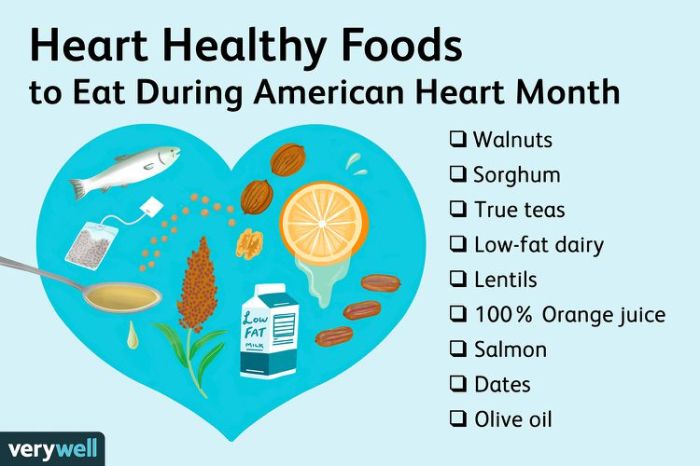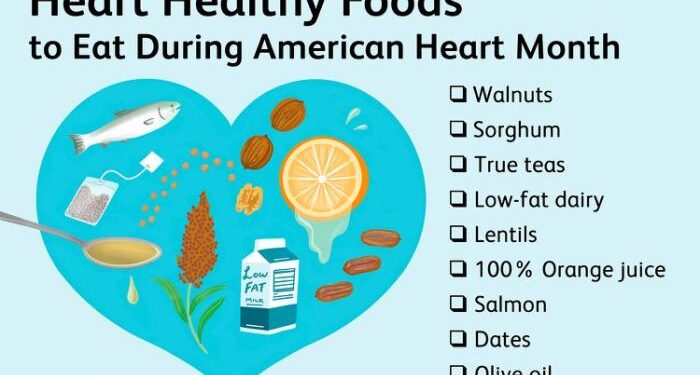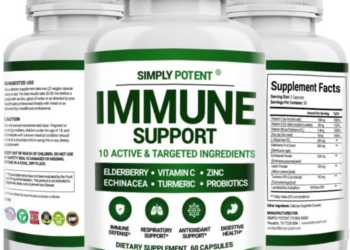Exploring the realm of heart health through nutrition opens doors to a world of possibilities. Dive into the essence of top nutrition plans for heart health, uncovering the secrets to a stronger heart and a healthier life. Let's embark on this journey together as we unravel the key to a thriving cardiovascular system.
Delve deeper into the components of a heart-healthy diet and discover the power of specific nutrients in nourishing your heart.
Importance of Nutrition for Heart Health
Proper nutrition plays a crucial role in maintaining heart health. By consuming a balanced diet rich in essential nutrients, individuals can significantly reduce the risk of developing heart diseases and other cardiovascular complications.
Impact of Specific Nutrients on Heart Health
- Omega-3 fatty acids: Found in fatty fish like salmon and mackerel, omega-3 fatty acids help reduce inflammation and lower the risk of heart disease.
- Antioxidants: Vitamins C and E, as well as beta-carotene, help protect the heart by neutralizing free radicals and reducing oxidative stress.
- Fiber: Soluble fiber found in fruits, vegetables, and whole grains can help lower cholesterol levels and improve heart health.
Role of a Balanced Diet in Preventing Heart Diseases
A balanced diet that includes a variety of fruits, vegetables, whole grains, lean proteins, and healthy fats is essential for preventing heart diseases. By avoiding processed foods high in saturated fats, sugars, and sodium, individuals can maintain a healthy weight and reduce the risk of hypertension, high cholesterol, and other cardiovascular conditions.
Components of a Heart-Healthy Diet

Eating a heart-healthy diet is crucial for maintaining cardiovascular health and preventing heart disease. A well-balanced nutrition plan can help lower cholesterol levels, reduce blood pressure, and decrease the risk of heart attacks and strokes.
Types of Fats and Their Effects on Heart Health
When it comes to fats, not all are created equal. Saturated fats and trans fats are known to raise LDL (bad) cholesterol levels, increasing the risk of heart disease. On the other hand, unsaturated fats, such as monounsaturated and polyunsaturated fats, can help lower LDL cholesterol and reduce inflammation in the body.
Omega-3 fatty acids, found in fatty fish like salmon and flaxseeds, are especially beneficial for heart health as they can lower triglyceride levels and reduce the risk of arrhythmias.
The Importance of Fiber, Antioxidants, and Vitamins
Fiber plays a crucial role in heart health by helping to lower cholesterol levels and regulate blood sugar levels. It also promotes a healthy gut microbiome, which is linked to overall well-being. Antioxidants, found in fruits, vegetables, and whole grains, help protect the heart by reducing inflammation and oxidative stress.
Vitamins such as vitamin C, E, and D are also important for maintaining heart health as they support the immune system, reduce inflammation, and improve overall cardiovascular function.
Top Nutrition Plans for Heart Health

When it comes to maintaining heart health, following a well-balanced and nutritious diet is essential. There are several popular nutrition plans that are recommended for promoting cardiovascular wellness.
DASH Diet
The DASH (Dietary Approaches to Stop Hypertension) diet is often recommended for heart health. This plan emphasizes consuming fruits, vegetables, whole grains, lean proteins, and low-fat dairy products. It also encourages limiting foods high in saturated fats, cholesterol, and sodium.
The DASH diet has been shown to lower blood pressure and reduce the risk of heart disease.
Mediterranean Diet
The Mediterranean diet is another popular choice for promoting heart health. This plan focuses on consuming plenty of fruits, vegetables, whole grains, nuts, seeds, and olive oil. It also includes moderate amounts of fish, poultry, and dairy, while limiting red meat and processed foods.
The Mediterranean diet is associated with a reduced risk of heart disease and stroke.
Implementing a Heart-Healthy Diet
Transitioning to a heart-healthy diet can significantly improve your overall health and well-being. Here are some practical tips to help you incorporate more fruits and vegetables, reduce salt and sugar intake, and plan meals that support heart health.
Incorporating More Fruits and Vegetables
- Start your day with a fruit smoothie or add berries to your breakfast cereal.
- Snack on fresh fruits like apples, oranges, or grapes throughout the day.
- Include a variety of vegetables in your meals, such as leafy greens, bell peppers, and carrots.
- Try roasting vegetables with herbs and spices for added flavor.
Reducing Salt and Sugar Intake
- Avoid adding extra salt to your meals and use herbs and spices for seasoning instead.
- Read food labels to choose low-sodium options and limit processed foods high in salt.
- Swap sugary drinks for water, herbal tea, or infused water with fruits and herbs.
- Use natural sweeteners like honey or maple syrup in moderation.
Meal Planning for Heart Health
- Plan your meals in advance to ensure they are balanced and nutritious.
- Include lean proteins like fish, poultry, and legumes in your meals.
- Choose whole grains like quinoa, brown rice, and oats for fiber and nutrients.
- Prepare meals in batches to have healthy options readily available during busy days.
Summary
In conclusion, the path to a healthy heart lies in the choices we make every day. By embracing top nutrition plans for heart health, we pave the way for a vibrant and fulfilling life. Let your heart beat strong with the wisdom of nourishing foods and wholesome habits.
Query Resolution
What are some examples of nutrients that impact heart health?
Omega-3 fatty acids, potassium, and magnesium are some nutrients that play a crucial role in maintaining heart health.
How does the DASH diet benefit heart health?
The DASH diet emphasizes fruits, vegetables, and whole grains, which are beneficial for reducing blood pressure and promoting heart health.
What strategies can help in reducing salt intake for better heart health?
Opting for herbs and spices as flavor enhancers instead of salt, and reading food labels to monitor sodium content can aid in reducing salt intake for improved heart health.











